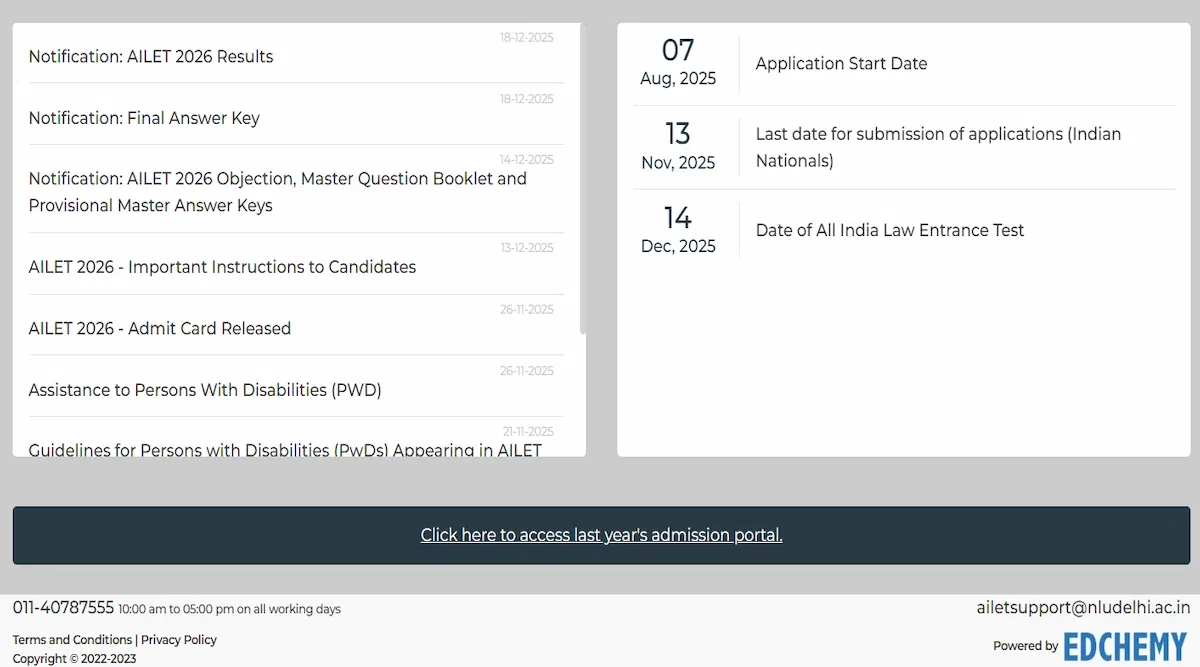Why is becoming a lawyer a great idea? It is said that nearly 2.5% of the Indian population is expecting for their Justice. So here's how to become a lawyer?
Table of Contents
How to become a lawyer? Being a lawyer requires one to be aware of the laws of the land and the culture and hierarchy of society. A lawyer should have a basic idea on human psychology, and the basic requirements to become a lawyer are an undergraduate Law degree and clearing the BAR council exam or state BAR council exam.
How to Become a Lawyer in India?
The field of law covers legislation, briefs, justice served, and much more. The field of law has many passions and aspirations, and the precursors of this system include lawyers. Learn the processing steps to become a lawyer:
- Step 1: Make a Decision
- Step 2: Qualification
- Step 3: Apply for the Entrance Test
- Step 4: Apply for Law School Admission
- Step 5: After Admission in Law School
- Step 6: Search for Jobs
All know that becoming a powerful lawyer is not an easy task. Therefore, one needs to think before they choose their career as a lawyer. To become a successful lawyer, then you must be a hard worker with dedication. Learn more about the steps listed above.
Step 1: Make Your decision
To become a lawyer, students have to choose between two options, whether to do law after 12th or after graduation.
Pursuing law after the 12th: After the 12th students can apply for Law entrance exams for law courses in India after the 12th.
- The exams conducted for students appearing for law after the 12th are:
- CLAT
- The law courses students can pursue after the 12th are:
Pursuing law after graduation: If one is interested in pursuing a law career in a particular field, a student must hold a degree first.
- Exams are conducted for students appearing for law after graduation
- CLAT
- AILET
- SLAT
- BLAT
- The law courses students can pursue after 12th are:
Please Note: All National Law Universities (NLUs) except NLU Delhi participate in CLAT.
Step 2: Qualify Yourself
After choosing from the above option, know about the entrance exams available to become a lawyer and make themselves qualify for the exams. The following are the details of the exams available for law:
Score good marks:
- Students must have completed 10+2 with a minimum of 50-60% aggregate from a recognised board.
- However, top law schools demand a graduate percentage of 85% and above with eligible entrance scores.
The top law exams in India are:
- Common-Law Admission Test (CLAT) is the main written examination that allows students to get admission to 21 National Law universities in India for law courses such as LLB and LLM.
- Other than these popular entrance exams, the university conducted other autonomous entrance exams under its norms.
CLAT Exam: The exam is conducted for Indian nationals and NRIs alone. If the student is a foreign national willing to pursue law in India, contact the university and know about international students' admission.
Below are the highlights of the CLAT exam.
- The exam pattern for the CLAT exam comprises English, including Comprehension, General Knowledge and Current Affairs, Elementary Mathematics (Numerical Ability), Legal Aptitude, and Logical Reasoning.
- To apply for an undergraduate law course, one must hold a minimum of 45% aggregate in the 12th exam.
- For a postgraduate programme, one must hold a bachelor's degree in a relevant field with a minimum of 50% aggregate in any recognized university.
LSAT Test: The Law School Admission Test (LSAT) is a standardised law test conducted six times a year. The LSAT test tests the critical and analytical skills of the candidates. LSAT scores are mandatory for higher-ranked universities across the world. Below are the key differences between LSAT India and LSAT Abroad.
- LSAT India is a standardized test developed by the Law School Admission Council to enter India's top law schools. LSAT India is conducted once a year.
- LSAT Abroad or LSAT is a standardized test developed by the Law School Admission Council to enter the top law schools in the world, excluding India. LSAT is conducted four times a year (February, June, September/October, and December).
More about entrance tests: Students require a high GPA with good entrance exams to get into high-ranked law schools. If one intends to pursue law in India, then make sure to meet the cutoff marks released by the Bar Council of India. Besides, some top law colleges consider the Law School Admission Test (LSAT-India).
Step 3: Apply for the Entrance Test
After choosing the entrance exam, students have to apply for the exam. Following is the process to apply for Entrance Exams:
Register for the test: CLAT scores give great attraction to law school applications, making students' applications stand out among others.
- Give enough time before giving the entrance exam. Register for the exam on the official website. If one wants to become a lawyer within a few years after graduation, then apply for the exam in September/October of the graduation year.
Prepare yourself for the test: CLAT is the most standardised law school entrance in India. Therefore, it adds great value to the application. CLAT tests students' logical reasoning, analytical & aptitude skills, and reading comprehension. The primary tips and details of entrance test preparation are,
- The CLAT test comprises five sections of multiple-choice questions where students get one mark for each correct answer and minus 0.25 marks for each wrong answer.
- To clear this exam, one needs to take adequate time to prepare for the exam.
- Practice mock tests using the previous year's CLAT question paper.
Give your best at the test: CLAT is a two-hour examination that is conducted once a year. The CLAT scorecard is valid for one year.
Reappear if you aren't satisfied: Don't be worried if one failed or is not satisfied with the scores. Age is just a number here because these exams don't have any upper age limit to pursue law in India.
Law schools need a score of 50% or above in CLAT. If one fails to meet that score, take the preparation time even harder and apply for the exam next year because they don't have any restrictions on attempts.
Step 4: Apply for Law School Admission
Apply to multiple colleges: Students have no restrictions to apply for law schools. This may increase the acceptance rate. A few best law colleges in India are:
- National Law School of Indian University, Bangalore
- ILS Pune
- Government Law College, Mumbai
- National Law Institute University, Bhopal
- NLU Kolkata
After clearing the entrance exams, students can apply for the law school of their choice. The following are the details of applying to law school:
Don't forget to have important documents: After clearing the entrance exam, apply for CAS as soon as possible.
- Don't forget to buy Credential Assembly Service (CAS). Most law schools use CAS. Once you send the transcripts, recommendation letters, and scores, they create them into a file and send them to law schools.
- The second important document is the recommendation letter. Usually, law schools prefer a recommendation letter from their undergraduate faculty. Otherwise, one can also get a recommendation letter from present or past employers.
- Now, a very important thing is the short essay. It is a good opportunity to attract the committee by expressing your new ideas in the field of study. If they are given a word limit for the essay, stick to it.
- Finally, the cover letter should be very impressive so that the committee will know how interested you are in becoming a lawyer.
Choose a good college using your Entrance score: When you are applying for law schools, you should check the following to get yourself into a better law school,
- Check out the UGC and BCI-approved law schools. If you don't get into any approved law schools, try again to prepare well.
- Use your CLAT/LSAT - India or another entrance score accepted by the Indian law school and your percentage to find a better law school for your scores.
- Check for a passage rate of employment before you select a law school.
Step 5: After Admission to Law School
After getting admission to law school, students must be careful about some aspects of law school and studies.
The following are some tips for students after joining law school:
Be full-time: To become a powerful lawyer, one needs to work hard also. You only need to show your entire commitment only to becoming a lawyer.
- Make sure to choose a full-time programme and concentrate on classes.
- Being a full-timer will keep you focused on the goal to become a lawyer.
Create a network and join study groups: Law schools may be too much to handle. So to handle such situations, students can join a study group which is a great opportunity to meet people and prepare for exams. Take your exams seriously because grades are very important for placements.
Clear BAR exam: Now, graduates can select a particular state to practice after their graduation.
- Each state has its bar exam which is conducted by the State Bar Council. So to practice in a particular state, graduates need to clear that bar exam.
- Also, they can apply for the All India bar council exam conducted by the Bar Council of India.
- Register for the bar exam and collect the required materials and prepare for the exam.
- After passing the bar exam, graduates need to complete the character and fitness review.
Step 6: Search for Jobs
The main purpose of studying in a top institute is to get a job with a good package. To get the dream job, you have to put in a lot of effort.
Following are some of the tips to get the dream job:
Apply for on & off-campus interviews: Start searching for a job early by being a clerk in the semester holidays. It may not pay you well, but then it gives you a great connection with lawyers. You may decide which law you are going to practice.
- Don't forget to apply for your campus placements and off-campus internships in your final year. Have your resume and other graduation documents handy.
Search through student-alumni networks: Your college study groups and alumni networks are great sources here. So contact the alumni and search for jobs through them.
Volunteer work: Doing volunteer work may not be good money, but it will give you experience and great value. To become a good lawyer and get an apt answer to this question, start doing Volunteer work after graduation. Volunteer work helps you keep your skills updated, and graduates can add that to their resumes.
Different Job Roles: Here is the list of various types of lawyers.
- Intellectual Property Lawyer
- Personal Injury Lawyer
- Bankruptcy Lawyer
- Family Lawyer
- Employment Lawyer
- Mergers and Acquisitions Lawyer
- Immigration Lawyer
- Criminal Lawyer
- Digital Media and Internet Lawyer
- Medical and Malpractice Lawyer
Also Read: Steps to Become a Judge
Law Courses in India
There are many law courses in India, and each course has its own career prospects and scope. The duration of each course also varies from one course to another.
Some of the top courses in India are:
- Law Courses After 12th
- LLB After Graduation
- Diploma in Law Courses
- Integrated Law Courses
- Online Law Courses
- Law Certification Courses
- Distance Law Courses
- Short-Term Law Courses in India
- Postgraduate Law Courses
Law Courses After 12th
As mentioned earlier, students have two options to get admission to law colleges after the 12th or after graduation. If students want to do law after the 12th, they have two options mentioned below. The duration of undergraduate courses is three years, and the basic eligibility is to get a passing mark in the 12th board exams.
The below mentioned law courses after the 12th are as follows:
- Bachelor of Legislative Law (LLB)
- Bachelor of Law in Intellectual Property Rights
LLB After Graduation
As all might know, there are two ways of pursuing an LLB: a 5-year course and a 3-year course. The five-year courses are integrated LLB courses like BA LLB, B.Com LLB, BBA LLB. However, while pursuing an LLB after graduation, then the 3-year course is the only option.
The age limit set by BCI (Bar Council of India) is 45. So normally, candidates who want a job change pursue the 3-year LLB course. Especially people from engineering backgrounds who have taken a liking for a 3-year LLB course.
However, there is a disadvantage in LLB after graduation, i.e., The students cannot choose any subject of their choice. They must study the subjects prescribed by the university. The students of the 3-year LLB course get less time to learn the legal subjects compared to the 5-year LLB course. The students do get internships and moot court practice.
After graduation, the option of LLB should be the last because you are an engineering graduate. It becomes 7-years of total education, and it can be a tedious process to learn something completely new and succeed in it as a career. If you plan to pursue LLB as a course after the 12th, go for the 5-year integrated course.
Diploma in Law Courses
Diploma courses have a course duration of one to three years, and the eligibility for this course is graduation from BA/B.Sc. in relevant fields. If students want, they can also do a diploma in law in place of the full course. The duration of diploma courses is shorter than full courses.
Some of the Law diploma courses are as follows:
- Diploma in Criminology
- Diploma in Business Law
- Diploma in Human Rights
- Diploma in Labour Law (DLL)
- Diploma in Cyber Law
Integrated Law Courses
All Integrated courses are five-year degree courses. It is a choice for students who want to complete both bachelor's and masters simultaneously. The eligibility for this course is to complete intermediate or an equivalent law with an aggregate of a minimum of 50%.
- Integrated Undergraduate degree
- B.A.+LLB
- B.Sc.+LLB
- BBA+LLB
- B.Com+LLB
- B.S.L.+LLB
- BA+LLB - Bachelor of Arts+Bachelor of Legislative Law
- B.Sc.+LLB - Bachelor of Science+Bachelor of Legislative Law
- BBA+LLB - Bachelor of Business Administration+Bachelor of Legislative Law
- B.Com+LLB - Bachelor of Commerce+Bachelor of Legislative Law
- B.S.L.+LLB - Bachelor of Socio-Legal Sciences+Bachelor of Legislative Law
Online Law Courses
Online law courses are usually very beneficial because if a law aspirant prefers online courses, then he/she can save time, lower costs, have an opportunity to switch careers, and practice individually.
These are the online law courses provided in India.
- FICCI's online course on IPRs (Intellectual Property Rights)
- Certified law analyst courses by Law Pundit Global
- Indian Law Institute also provides online courses through Shiksha.
- IALM's online courses on practical lawyering skills
- Enhelion's certificate program
- CIRC online course on competition law
Candidates working in the law field can continue their education with online courses. Some of the job designations that aspirants can reach are
- Criminal Lawyer
- Civil Litigation lawyer
- Document drafting lawyer
- Legal analyst
- Legal Journalist
- Legal advisor
- Government lawyer
- Judge
Law Certification Courses
Here are some of the Law certification courses. Along with the certification courses, the respective websites are also provided below. The duration of these courses varies from one to another. The average duration to complete these certification courses is 4-6 months.
Below are the certification courses in Law.
| Certification Courses | Website |
| Corporate Law | Swayam |
| Corporate Law Analyst | V Skills |
| Trademark Analyst | Shine learning |
| Business Law Analyst | Shine learning |
| Corporate Law | Target Study |
| Contract Law Analyst | Shine learning |
| Human Rights Law Professional | Shine learning |
Distance Law Courses
Some of the top universities in India, as well as in the world, provide distance law courses. So that students who can't do classes due to some reasons can do law courses while sitting at home.
Following are the universities and the distance law courses offered by them.
- IGNOU
- Awareness course in Intellectual Property Rights
- Certificate in (Consumer protection, Cooperation, Co-operative and business, Human rights, and Humanitarian
- PG Certificate in Cyber
- PG Diploma in (Environment and Intellectual Property Rights)
- PhD
- Annamalai University
- BA in Human Rights
- BAL - Bachelor of Academic Law
- BGL - Bachelor of General Law
- Diploma in (Human Rights, Labour with Administrative and Taxation)
- MA in Human Rights
- PG Diploma in (Intellectual property and Medical laws & Ethics
- National Law School of India University
- MBL Business
- PG Diploma in (Child Rights, Environmental, Human Rights, Intellectual Property Rights, and Medical & Ethics)
- Madurai Kamaraj University
- BGL (General Law)
- PG Diploma in (Consumer, Information & Communication and Labour & Administrative)
- Guru Nanak Dev University
- LLB (Academics)
Short Term Law Courses in India
In place of doing a full course, students can opt for a short-term course for law in India also. In addition, many top universities of India offer short-term law courses in India.
Some of the short term law courses are as follows:
- Certificate Course in Consumer Awareness
- Certificate Course in Women and Law
- Diploma in Labour Laws (DLL)
- Diploma in Taxation Laws (DTL)
- Post Graduate Diploma in Consumer Awareness
- Post Graduate Diploma in Intellectual Property Laws
- Post Graduate Diploma in Intellectual Property Rights and Patent Management
Postgraduate Law Courses
Master courses are the courses done after graduation, and they can be either after a bachelor's or diploma. There are plenty of courses that are to be done after a bachelor's or diploma. Therefore, candidates do have various opportunities to select which stream they want to pursue.
Some of the master courses that are formulated after bachelors or diploma
- Master of Legislative Law in Business Law
- Master of Law in Constitutional Law and Administrative Law
- Master of Law in Bharatiya Nyaya Darshan and Raj Dharma
- Master of Law in Corporate and Finance Law
- Master of Legislative Law in Criminal Law and Commercial Law
- Master of Legislative Law in Criminal Law and Criminology
- Post Graduate Diploma in Administrative Law
- Post Graduate Diploma in Business & Corporate Law
- Post Graduate Diploma in Child Rights and Development
- Post Graduate Diploma in Consumer Laws
- Post Graduate Diploma in Cyber Law
- Post Graduate Diploma in Cyber Law and Intellectual Property Rights
Also Read: Top 10 Law Diploma Courses in India 2025
Law Course Duration
Out of numerous courses, LLB is the most common Law course opted by the students. LLB is a three-year undergraduate program. Later, students who complete LLB and want to pursue a master's in this field can opt for LLM, a master's, and the duration of this program will be no more than two years. LLM program duration differs from one course to another; it can be either a one-year or two-year program.
There is another program called the integrated program, and the duration of this course is five years. It is the integration of LLM and LLB.
Also Read: Types of Lawyers in India
Top Law Colleges in India
In India, becoming a lawyer and fighting for the needs, and serving the rights of people is a dream of many youngsters these days. Students can fulfil their dream by applying to law colleges. Generally, law colleges take admission based on the result and your score of CLAT, LSAT, and other Law Entrance Exams.
The colleges below are the top law colleges in India:
- National Law School of India University, Bangalore
- National Law University, New Delhi
- Jindal Global Law School, Sonipat
- NALSAR Law University, Hyderabad
- Indian Institute of Technology, Kharagpur
- Symbiosis Law School, Pune
- National Law University, Jodhpur
- Gujarat National Law University, Gandhinagar
- National Law Institute University, Bhopal
- Rajiv Gandhi National University of Law, Patiala
- Faculty of Law University of Delhi
- The West Bengal National University of Juridical Sciences, Kolkata
- Maharashtra National Law University, Mumbai
- Dr Ram Manahor Lohiya National Law University, Lucknow
- Indian Law Society Law College, Pune
- National University of Advanced Legal studies, Kochi
- Chanakya National Law University, Patna
- National Law University, Cuttack
- Indian Law Institute, New Delhi
Also Read: Top Law Universities In India 2025
Lawyer Salary in India
On average, a lawyer earns between INR 3 and 5 Lakhs per annum in India. However, depending on the specialisations and experience, the lawyer's salary varies, and the survey says that there are advocates who charge from INR 5 Lakhs to INR 1 Crore for one court appearance.
- The criminal lawyer generally earns from INR 6 to INR 8 lakhs per annum, whereas intellectual property lawyers earn up to 3,00,000 per annum.
- A corporate lawyer earns an average of INR 7 Lakh per annum, and a Legal manager earns an average of INR 8 Lakhs per annum.
Here we have updated with the latest results of types of lawyers and salaries in India.
| Types of Lawyers | Corporate Lawyer (Per Annum) | Attorney/Lawyer (Per Annum) |
| Average Salary | INR 6.95 Lakh | INR 4.45 Lakh |
| Minimum Salary | INR 1.45 Lakh | INR 1.77 Lakh |
| Maximum Salary | INR 20 Lakh | INR 30 Lakh |
Also Read: Top Career Options in Law
Importance of Lawyer
A lawyer represents his client and advises them on legal situations. From individual cases to whole companies, from court proceedings to small disputes behind closed doors, it's the lawyer's job to act in the client's best interest.
A lawyer needs to have his client's best interests at hand whatsoever, and that may include reimbursements, negotiations, and everything legal that won't put your client's stakes at risk.
Not just stuck in a courtroom, a lawyer can work on criminal or civil lawsuits, so a variety of jobs can crop up and serve your career interests, be it just one or multiple of them. Once you're representing a client in court. Next you could be finalizing a divorce, drawing up a will, or just advising on minor legal issues.
As a lawyer, one moment you are handling and defending a false rape accusation, and the next moment, you could be booked for perjury if you make one wrong move.
Also Read: 10 Types of Law Degrees in India
Duties of a Lawyer
The daily tasks will depend on their client's needs and whether they are specialized in a particular area of law, but they could be doing some or all of the tasks.
The following are some of the duties and responsibilities of a lawyer:
- Attend court hearings with prior preparation
- Drawing up contracts and legal documents
- Explaining the law and giving general legal advice
- Settling disputes and supervising any agreements
- Researching and gathering evidence
- Analyzing legal documents
- Supervised legal assistants
- Handling cases like a diplomat
- Backing up accusations with evidence
- Defending and Prosecuting
- Heeding the Plaintiff's demands and requests
Also Read: Best Law Specialisations in Demand
Lawyer Qualities
When a lawyer takes a case, the client's faith depends on the lawyer and his qualities to win a case.
The following are some of the qualities a lawyer must have:
- Communication skills
- Ability to make judgments
- Analytical skills
- Research skills
- People skills
- Perseverance
- Creativity-based skills
Also Read: How to Become a Civil Lawyer
Skills Required by a Lawyer
The lawyer needs many skills to fight, win against an opponent, impress a judge and save their client.
The following are the skills that are to be polished for a candidate to become a lawyer:
- Oral communication
- Written communication
- Client service
- Time management
- Analytical and logical research
- Legal research
- Knowledge of the present technology
- Knowledge of the laws
Also Read: Top Female Lawyers in India























POST YOUR COMMENT